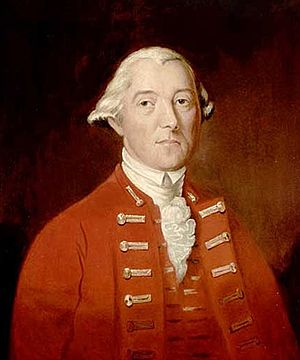Guy Carleton facts for kids
Quick facts for kids
Lord Dorchester
|
|
|---|---|
 |
|
| Governor of the Province of Quebec | |
| In office 1768–1778 |
|
| Monarch | George III |
| Preceded by | James Murray |
| Succeeded by | Sir Frederick Haldimand |
| Governor General of The Canadas | |
| In office 1786–1796 |
|
| Monarch | George III |
| Preceded by | Sir Frederick Haldimand |
| Succeeded by | Robert Prescott |
| Personal details | |
| Born | 200px 3 September 1724 Strabane, County Tyrone, Ireland |
| Died | November 10, 1808 (aged 84) Maidenhead, Berkshire, England |
| Resting place | 200px |
| Parent |
|
| Awards | KB |
| Military service | |
| Allegiance | |
| Branch/service | British Army |
| Years of service | 1742 – 1796 |
| Rank | Major-General |
| Commands | America Quebec The Canadas |
| Battles/wars | War of the Austrian Succession Seven Years' War American War of Independence |
Guy Carleton, 1st Baron Dorchester (born September 3, 1724 – died November 10, 1808) was an important British soldier and leader. He was born in Ireland but served Great Britain. He is best known for his time as the Governor of the Province of Quebec. He held this role twice, first from 1768 to 1778, and again from 1785 to 1795.
Carleton also played a key part in the American War of Independence. He led British troops, especially during the defense of Quebec in 1775. He also oversaw the evacuation of British forces and their allies from New York City in 1783. In 1786, he was given the special title of Baron Dorchester.
Contents
Who Was Guy Carleton?
Guy Carleton was a highly respected military officer and a skilled administrator. He was known for his leadership during challenging times in North America. His actions helped shape the early history of Canada.
Early Life and Military Career
Guy Carleton was born in Strabane, Ireland, in 1724. He began his military career in the British Army in 1742. He fought in several major conflicts. These included the War of the Austrian Succession and the Seven Years' War. His experience in these wars prepared him for future leadership roles.
Governor of Quebec
Carleton first became the Governor of the Province of Quebec in 1768. This was a very important job. Quebec had recently become a British territory after the Seven Years' War. Carleton worked to create fair laws and policies for the people living there. He understood the unique culture of Quebec.
The Quebec Act
One of his most important achievements was the Quebec Act of 1774. This law protected the rights of French-speaking Canadians. It allowed them to practice their religion and use their own legal system. This act helped keep Quebec loyal to Britain during the American Revolution.
Role in the American Revolutionary War
When the American War of Independence began, Carleton was still Governor of Quebec. The American rebels tried to invade Quebec in 1775. Carleton successfully defended the city of Quebec against their attack. This was a crucial victory for the British.
Commander-in-Chief
From 1782 to 1783, Carleton became the commander-in-chief of all British forces in North America. This meant he was in charge of all British military operations. He had a very difficult task ahead of him.
Evacuation of Loyalists and Freedmen
After the war, Carleton oversaw the evacuation of British forces from New York City. He also made sure that Loyalists were safely moved. Loyalists were people who supported Britain during the war.
Carleton also kept a promise made by the British Crown. This promise offered freedom to enslaved people who joined the British side. He helped more than 3,000 formerly enslaved people leave New York. They were transported to British colonies, mostly in Nova Scotia. To help with this, Carleton ordered the creation of the Book of Negroes. This book listed the names of all the formerly enslaved people who were evacuated.
Later Years and Legacy
Carleton returned to North America as Governor General of The Canadas in 1786. He continued to work on important issues for the colonies. He retired in 1796 and passed away in 1808.
Guy Carleton is remembered as a key figure in Canadian history. His leadership helped maintain British control in North America. He also worked to protect the rights of different groups of people. His brother, Thomas Carleton, also served under him.
 | Aaron Henry |
 | T. R. M. Howard |
 | Jesse Jackson |

